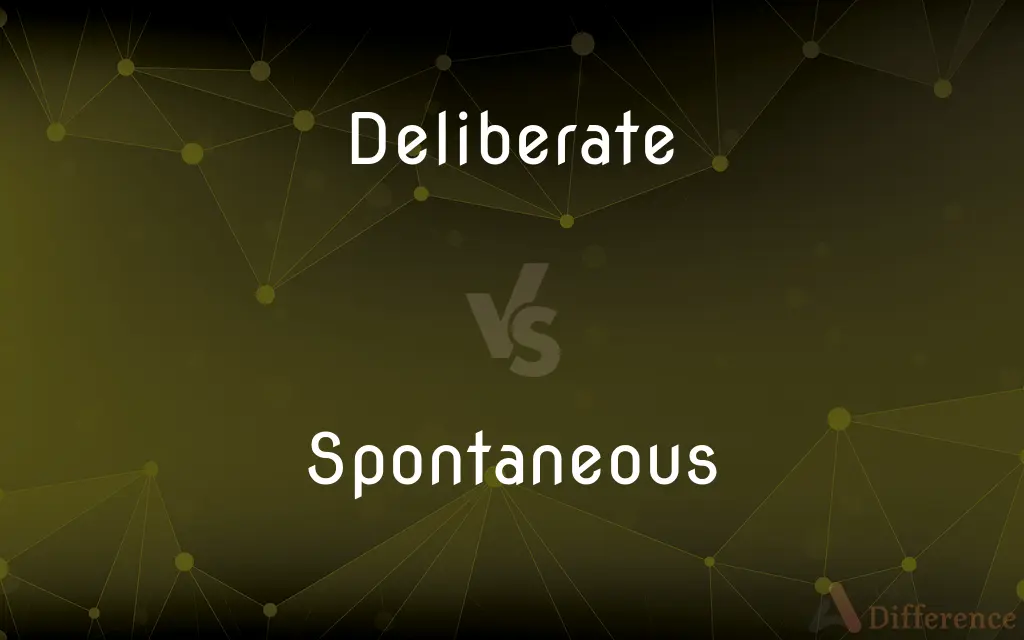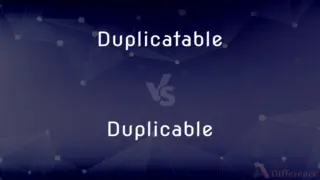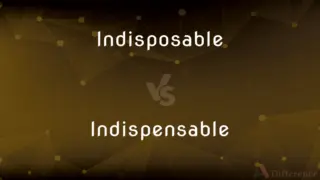Deliberate vs. Spontaneous — What's the Difference?
Edited by Tayyaba Rehman — By Fiza Rafique — Updated on April 3, 2024
Deliberate actions are consciously planned and considered, while spontaneous actions occur without premeditation or external stimulus.

Difference Between Deliberate and Spontaneous
Table of Contents
ADVERTISEMENT
Key Differences
Deliberate actions stem from careful thought and planning, often involving weighing the pros and cons before making a decision. On the other hand, spontaneous actions are impromptu, arising naturally and without forethought, reflecting immediate feelings or reactions.
While deliberate actions are characterized by intentionality and a degree of caution, spontaneous actions are driven by instinct or immediate emotional responses. These actions are more likely to be unpredictable and can sometimes lead to unexpected outcomes.
Deliberate decision-making processes usually involve a deliberate analysis of the situation, considering various outcomes and the impact of each action. Conversely, spontaneous decisions are made in the moment, often under the influence of current emotions or circumstances, without such detailed analysis.
In a work environment, deliberate actions can lead to well-thought-out strategies and careful planning, essential for achieving long-term goals. Meanwhile, spontaneous actions can foster creativity and innovation, breaking from routine and potentially leading to novel solutions.
In personal relationships, a deliberate approach might involve thoughtful gestures and communication, showing care and consideration. Spontaneous actions, while perhaps less planned, can inject energy and excitement into relationships, demonstrating authenticity and unguarded emotion.
ADVERTISEMENT
Comparison Chart
Precedence
Actions follow thorough planning and consideration.
Arise naturally without premeditation.
Motivation
Driven by logic and reasoned thinking.
Driven by instinct or immediate emotions.
Outcomes
Predictable and controlled outcomes.
Unpredictable and varied outcomes.
Role in Decision-Making
Involves detailed analysis and evaluation.
Quick decisions based on current context.
Impact on Relationships
Demonstrates care through consideration.
Shows authenticity through spontaneity.
Compare with Definitions
Deliberate
Intentionally considering all factors before acting.
She made a deliberate choice to change her career path.
Spontaneous
Involving actions governed by sudden desires.
They went on a spontaneous adventure, with no destination in mind.
Deliberate
Reflecting a slow and careful action.
She answered the question with deliberate slowness. choosing her words carefully.
Spontaneous
Characterized by natural, uninhibited behavior.
Her spontaneous hug caught him by surprise.
Deliberate
Proceeding with caution and thorough planning.
He approached the negotiation with deliberate caution.
Spontaneous
Occurring without external causation or planning.
Their laughter was spontaneous and contagious.
Deliberate
Characterized by careful and intentional decision-making.
Their deliberate strategy paid off in the long run.
Spontaneous
Arising from a momentary impulse or inclination.
He made a spontaneous decision to travel.
Deliberate
Involving conscious intent or purpose.
The move was a deliberate attempt to gain more control.
Spontaneous
Reflecting an immediate reaction to stimuli.
The crowd's spontaneous applause was overwhelming.
Deliberate
Done with or marked by full consciousness of the nature and effects; intentional
Mistook the oversight for a deliberate insult.
Spontaneous
Happening or arising without apparent external cause; self-generated
A microorganism capable of spontaneous movement.
Deliberate
Arising from or marked by careful consideration
A deliberate decision.
Spontaneous
Arising from a natural inclination or impulse and not from forethought or prompting
Spontaneous laughter.
A spontaneous protest.
Deliberate
Unhurried and careful
Moved at a deliberate pace.
Spontaneous
Unconstrained and unstudied in manner or behavior
A spontaneous personality.
Deliberate
To think carefully and often slowly, as about a choice to be made.
Spontaneous
Growing without cultivation or human labor
Spontaneous vegetation.
Deliberate
To consult with another or others in a process of reaching a decision.
Spontaneous
Self-generated; happening without any apparent external cause.
He made a spontaneous offer of help.
A make spontaneous decision
Deliberate
To consider (a matter) carefully and often slowly, as by weighing alternatives.
Spontaneous
Done by one's own free choice, or without planning.
Deliberate
Done on purpose; intentional.
Tripping me was a deliberate action.
Spontaneous
Proceeding from natural feeling or native tendency without external or conscious constraint.
Deliberate
Formed with deliberation; carefully considered; not sudden or rash.
A deliberate opinion; a deliberate measure or result
Spontaneous
Arising from a momentary impulse.
Deliberate
Of a person, weighing facts and arguments with a view to a choice or decision; carefully considering the probable consequences of a step; slow in determining.
The jury took eight hours to come to its deliberate verdict.
Spontaneous
Controlled and directed internally; self-active; spontaneous movement characteristic of living things.
Deliberate
Not hasty or sudden; slow.
Spontaneous
Produced without being planted or without human cultivation or labor.
Deliberate
(transitive) To consider carefully; to weigh well in the mind.
It is now time for the jury to deliberate the guilt of the defendant.
Spontaneous
Sudden, without warning.
Deliberate
(intransitive) To consider the reasons for and against anything; to reflect.
Spontaneous
Proceeding from natural feeling, temperament, or disposition, or from a native internal proneness, readiness, or tendency, without constraint; as, a spontaneous gift or proposition.
Deliberate
Weighing facts and arguments with a view to a choice or decision; carefully considering the probable consequences of a step; circumspect; slow in determining; - applied to persons; as, a deliberate judge or counselor.
Spontaneous
Proceeding from, or acting by, internal impulse, energy, or natural law, without external force; as, spontaneous motion; spontaneous growth.
Deliberate
Formed with deliberation; well-advised; carefully considered; not sudden or rash; as, a deliberate opinion; a deliberate measure or result.
Settled visage and deliberate word.
Spontaneous
Produced without being planted, or without human labor; as, a spontaneous growth of wood.
Spontaneous joys, where nature has its play,The soul adopts, and owns their firstborn away.
Deliberate
Not hasty or sudden; slow.
His enunciation was so deliberate.
Spontaneous
Happening or arising without apparent external cause;
Spontaneous laughter
Spontaneous combustion
A spontaneous abortion
Deliberate
Having awareness of the likely consequences; intentional.
Spontaneous
Said or done without having been planned or written in advance;
He made a few ad-lib remarks
Deliberate
To weigh in the mind; to consider the reasons for and against; to consider maturely; to reflect upon; to ponder; as, to deliberate a question.
Spontaneous
Produced without being planted or without human labor;
Wild strawberries
Deliberate
To take counsel with one's self; to weigh the arguments for and against a proposed course of action; to reflect; to consider; to hesitate in deciding; - sometimes with on, upon, about, concerning.
The woman that deliberates is lost.
Deliberate
Think about carefully; weigh;
They considered the possibility of a strike
Turn the proposal over in your mind
Deliberate
Discuss the pros and cons of an issue
Deliberate
By conscious design or purpose;
Intentional damage
A knowing attempt to defraud
A willful waste of time
Deliberate
With care and dignity;
Walking at the same measured pace
With all deliberate speed
Deliberate
Produced or marked by conscious design or premeditation;
A studied smile
A note of biting irony and studied insult
Deliberate
Marked by careful consideration or reflection;
A deliberate decision
Deliberate
Carefully thought out in advance;
A calculated insult
With measured irony
Common Curiosities
How do deliberate actions benefit decision-making?
Deliberate actions allow for thoughtful consideration of outcomes, leading to more informed and potentially beneficial decisions.
How does spontaneity manifest in behavior?
Spontaneity manifests as impromptu actions or reactions that occur without premeditation.
Can a person be both deliberate and spontaneous?
Yes, individuals can exhibit both deliberate planning in some aspects of life and spontaneity in others.
What defines a deliberate action?
A deliberate action is one that is intentionally planned and thought out before execution.
Can spontaneous decisions lead to regret?
Yes, because they are made without thorough consideration, spontaneous decisions can sometimes lead to regrettable outcomes.
Is it possible to plan for spontaneity?
While it sounds contradictory, people can create environments or situations where spontaneity is more likely to occur.
Is spontaneity a sign of emotional intelligence?
Spontaneity can indicate emotional intelligence when it reflects an ability to appropriately express emotions in the moment.
What role does spontaneity play in creativity?
Spontaneity can drive creativity by encouraging impulsive, uninhibited thoughts and actions, leading to innovative ideas.
Are deliberate actions always better than spontaneous ones?
Not necessarily; the effectiveness of each approach depends on the context and desired outcome.
How can spontaneity impact relationships?
Spontaneous actions can inject energy and authenticity into relationships, making them more dynamic and genuine.
Do spontaneous actions reflect one's true feelings?
Often, yes, as spontaneous actions are less influenced by social expectations and more by genuine impulses.
Can deliberate planning stifle spontaneity?
Yes, excessive planning can limit opportunities for spontaneous actions and the benefits they can bring.
How do people balance deliberateness and spontaneity in life?
Balancing involves recognizing the value of both approaches and applying them as appropriate to different situations and goals.
How do cultures view spontaneity versus deliberateness?
Cultural attitudes vary; some cultures value careful planning and deliberateness, while others celebrate spontaneity and flexibility.
How do deliberate and spontaneous actions influence learning?
Deliberate actions facilitate structured learning, while spontaneity can enhance experiential and adaptive learning.
Share Your Discovery

Previous Comparison
Duplicatable vs. Duplicable
Next Comparison
Indisposable vs. IndispensableAuthor Spotlight
Written by
Fiza RafiqueFiza Rafique is a skilled content writer at AskDifference.com, where she meticulously refines and enhances written pieces. Drawing from her vast editorial expertise, Fiza ensures clarity, accuracy, and precision in every article. Passionate about language, she continually seeks to elevate the quality of content for readers worldwide.
Edited by
Tayyaba RehmanTayyaba Rehman is a distinguished writer, currently serving as a primary contributor to askdifference.com. As a researcher in semantics and etymology, Tayyaba's passion for the complexity of languages and their distinctions has found a perfect home on the platform. Tayyaba delves into the intricacies of language, distinguishing between commonly confused words and phrases, thereby providing clarity for readers worldwide.














































